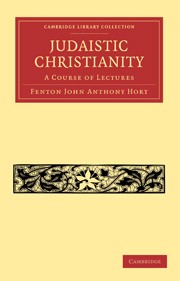Book contents
- Frontmatter
- PREFACE
- Contents
- I INTRODUCTORY LECTURE
- II CHRIST AND THE LAW
- III THE EARLY CHURCH AT JERUSALEM
- IV THE CHURCH OF ANTIOCH
- V THE INDEPENDENT ACTIVITY OF ST PAUL
- VI ST PAUL AT JERUSALEM AND THE EPISTLES OF THE ROMAN CAPTIVITY
- VII THE PASTORAL EPISTLES
- VIII JAMES, I PETER, HEBREWS, APOCALYPSE
- IX THE CHURCH OF JERUSALEM FROM TITUS TO HADRIAN
- X THE JUDAIZERS OF THE IGNATIAN EPISTLES
- XI CERINTHUS, ‘BARNABAS,’ JUSTIN MARTYR
- XII PALESTINIAN EBIONITES
- APPENDIX
- INDEX
XII - PALESTINIAN EBIONITES
Published online by Cambridge University Press: 07 September 2011
- Frontmatter
- PREFACE
- Contents
- I INTRODUCTORY LECTURE
- II CHRIST AND THE LAW
- III THE EARLY CHURCH AT JERUSALEM
- IV THE CHURCH OF ANTIOCH
- V THE INDEPENDENT ACTIVITY OF ST PAUL
- VI ST PAUL AT JERUSALEM AND THE EPISTLES OF THE ROMAN CAPTIVITY
- VII THE PASTORAL EPISTLES
- VIII JAMES, I PETER, HEBREWS, APOCALYPSE
- IX THE CHURCH OF JERUSALEM FROM TITUS TO HADRIAN
- X THE JUDAIZERS OF THE IGNATIAN EPISTLES
- XI CERINTHUS, ‘BARNABAS,’ JUSTIN MARTYR
- XII PALESTINIAN EBIONITES
- APPENDIX
- INDEX
Summary
The relations between Jewish and Gentile Christians
Justin Martyr's account of Jewish Christians brings us to a fresh stage in our investigation.
Trypho, the Jewish interlocutor, asks him whether a man accepting Jesus as Christ, but desiring to keep the legal ordinances (defined in ch. xlvi. as sabbath-keeping, circumcision, observance of τὰ ἔµµηνα, probably New Moons, and certain ceremonial washings), shall be saved.
In my opinion, says Justin, he will, unless he labours to persuade Gentile converts to keep the same ordinances, declaring that they will not otherwise be saved.
Trypho asking why he says “In my opinion,” he replies “There are some who do not venture even to share speech or hospitality with such men: with whom I do not agree.” He repeats that Christian keepers of the Law who do not try to force their own ways on Gentile Christians ought, he thinks, to be admitted to fellowship ὡς ὁµοσπλάγχνοις καὶ ἀδεγφοῖς: but Christian Jews who do exercise such constraint, and refuse fellowship on other terms, “these also in like manner οὐκ ἀποδέχοµαι”; while those who, remaining Christians, are persuaded by them to adopt the Law, “I suppose shall perhaps also be saved;” but those Christians who for any reason adopt it but deny Jesus to be the Christ, if they do not repent before death, “οὐδʾ ὅλως σωθήσεσθαι ἀποφαίνοµαι”. The same is also his judgment on Jews who before death do not believe on, this Messiah, especially if in their synagogues they curse those who have so believed.
- Type
- Chapter
- Information
- Judaistic ChristianityA Course of Lectures, pp. 194 - 202Publisher: Cambridge University PressPrint publication year: 2009First published in: 1894



